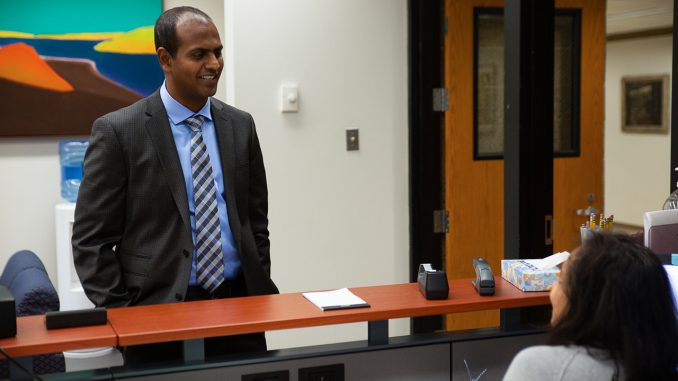
When Temple first tried to hire Jayanth Panyam in 2003, he passed up the offer, having already accepted a job at Wayne State University, said Michael Borenstein, the School of Pharmacy’s senior associate dean of operations.
Panyam was their best candidate at the time, he added.
“He gave a very good scientific talk,” said Borenstein, now the school’s senior associate dean of operations. “Even back then … he had a good command of the room as well as the scientific information he was presenting.”
In August, Panyam took Temple up on a job offer, but this time as the dean of the School of Pharmacy. He started on Nov. 1.
Panyam’s research, which focuses on drug delivery using nanotechnology, has earned him more than 11,000 citations as well as the Thomas Jefferson Ingenuity Award for Creativity and Ingenuity in Doctoral Research, according to a university release.
At the University of Minnesota, Panyam enjoyed his role as a department head and wanted to help others conduct their research on a larger scale, he said.
“While research is exciting and important, I realized that helping other people advance their vision of what they want to accomplish, that’s exciting too,” Panyam added.
Panyam, who grew up in Chennai, India, said one of his top goals as dean is to make sure that people outside of Temple and Philadelphia know about the exciting things happening at the School of Pharmacy.
“One of my important things to do here would be to tell the Temple story,” Panyam said.
The School of Pharmacy is home to the Moulder Center for Drug Discovery Research, a group of former pharmaceutical professionals who research and develop treatments for substance abuse disorders, Alzheimer’s disease and cancer, among others.
The school celebrated 50 years of its regulatory affairs and quality assurance program, which teaches students how to interpret and apply government regulations, on Oct. 2, Borenstein said. The program was the first of its kind in the country.
“People don’t know what a gem we have here nationally, and I think that’s going to be important moving forward because it’s a very competitive field,” Borenstein said.
Panyam enters into his position at a time when jobs for pharmacists in pharmacies and drug stores are expected to decrease, according to the Bureau of Labor Statistics, while the number of pharmacy schools and graduates have increased in recent years.
“The number of positions available within some regions of the country are fewer than the number of graduates, and that’s essentially because there are a lot of pharmacy schools that are now open in many parts of the country,” Panyam said. “And so that is, you know, there’s a competition for applicants.”
“But you know, Temple, this is one of the oldest school of pharmacies, and I think they’ve been, despite the problems, I think they’ve been doing a really good job of having tough applicants apply for a program and matriculate,” he added.
Swati Nagar, a pharmaceutical science professor, met Panyam several times at alumni breakfasts at the University of Minnesota. Nagar, who graduated from the University of Minnesota in 2003, said Panyam is kind and hard-working.
“He’s so even-keeled, and he seems like a very personable guy,” Nagar said.



Amazing…..